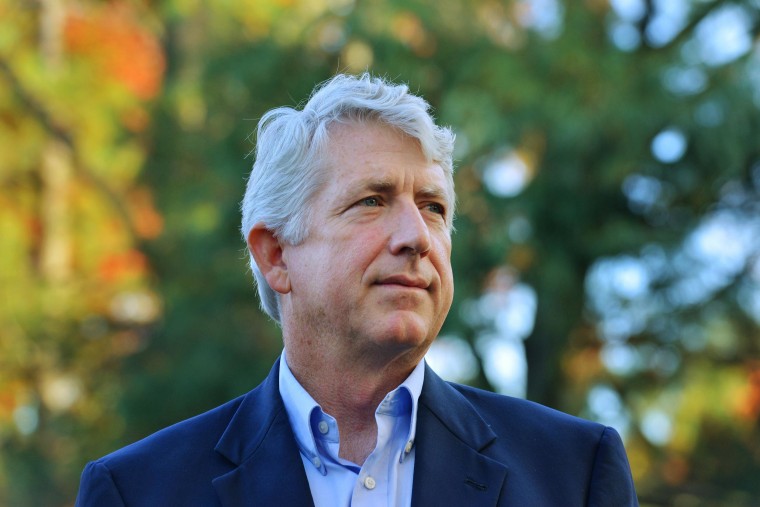He hasn't even been attorney general for two weeks, and he is already picking a battle that could have repercussions for marriage equality throughout the South.
But Democrat Mark R. Herring, who was started his new post as Virginia's attorney general on Jan. 11, is no stranger to challenges — especially ones that change the political DNA of his state.
Even securing his seat as attorney general was trying: He won a razor-thin election against his Republican challenger in November, marking the first time Democrats swept the top positions on the ballot in the state since 1969.
His latest fight comes in the form of supporting gay rights — something he had previously voted against.
Currently, only Washington, D.C., and 17 states allow gay marriage, most of which are in the Northeast.
"After a very careful and thorough analysis, I believe Virginia's ban on marriage between same-sex couples violates the 14th amendment of the United States Constitution, and as attorney general, I cannot and will not defend laws that violate Virginian's rights," Herring told NPR's "Morning Edition" in an interview that aired Thursday.
Herring's predecessor, Republican Ken Cuccinelli, had been vocal in his opposition to gay marriage. While Herring himself had voted in favor of the ban on same-sex marriage in 2006 when he was a state senator, he says his view have evolved since then.
"I saw very soon after that how that hurt a lot of people and it was very painful for a lot of people," he told NPR.
Before he was elected to serve as attorney general, Herring, 52, was a state senator for eight years, representing parts of Loudon and Fairfax Counties. Prior to that, Herring, who was born in Johnson City, Tenn., but has lived most of his life in Loudon County, Va., was a lawyer in Leesburg, Va., and then began his public service career in 1999 as a member of the Loudon County Board of Supervisors.
He embodied an open-government mentality as a state senator. Some of his most lauded achievements protected the most vulnerable of his constituents: He led efforts to protect kids by cracking down on synthetic drugs, and promoted legislation to target scammers who committed financial crimes against seniors. He also was a member of an advisory board that strengthened penalties for domestic violence.
"The moment your kids are born, your mission changes to giving them the best opportunities in life. For me, family is everything."
Family has always been important to the father of two: daughter Peyton, 21, and son Tim, 17. Last August, he told the Roanoke Times that part of why he changed his views on gay marriage was because he "talked to my family, and I have seen how I would not want the state to tell my son or my daughter who they can and cannot marry."
In a campaign ad released in September 2013, he told voters, "The moment your kids are born, your mission changes to giving them the best opportunities in life. For me, family is everything."
He and his wife Laura have been married for 24 years and are members of the Leesburg Presbyterian Church.
Rev. Deborah Dodson Parsons of the Leesburg Presbyterian Church, who has known Herring for years, described him as a faithful and active church member who is "reserved, maybe even a shy person."
"You know how you think of a politician? He does not wear that on his sleeve. Everyone always comments on that," she said. "He does not work the crowd at all; he is not pushing himself out there. He's the least politician of any politician."
He and his family attends church every Sunday, Parsons said, and are involved in the youth ministry.
"He's a great guy. Very active and very steady and quiet with his participation of the church," she said.
She added that she supported his decision to no longer defend the state's ban on gay marriage in federal lawsuits.
"I think it's a very courageous move on his part," she said.
Herring got a bachelor's degrees in foreign affairs followed by a combined foreign affairs/economics Master's of Arts from the University of Virginia. He graduated from University of Richmond School of Law before he returned to Loudon for his law practice in Leesburg.
As attorney general, Herring oversees an office of more than 425 employees. He is not the first attorney general to declare that he believes a state law is violating the Constitution: Last year, then-Attorney General Cuccinelli said his office would not defend one of Virginia Gov. Bob McDonnell's education measures. His analysis concluded that the law, which created a statewide school division to take over local schools that were failing academically, was unconstitutional.
He also isn't the first attorney general to stop defending their state's gay marriage ban, alleging it's unconstitutional. Pennsylvania Attorney General Kathleen Kane did the same thing last year.
